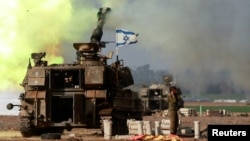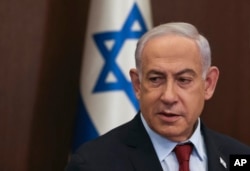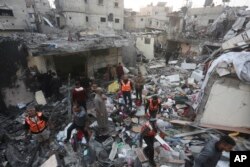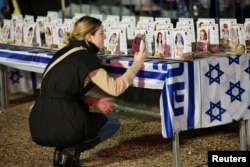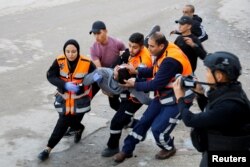Israeli Prime Minister Benjamin Netanyahu declared Tuesday that he has complete U.S. support for the Jewish state's ongoing ground offensive in Gaza against Hamas militants, and at the same time, the two countries remain resolute against growing international calls for a cease-fire to halt the Israel-Hamas war.
"I greatly appreciate the American support for destroying Hamas and returning [about 140 remaining] hostages" captured by Hamas during its October 7 attack that killed about 1,200 people in southern Israel, the Israeli leader said.
"Following an intensive dialogue with President [Joe] Biden and his team, we received full backing for the ground incursion and blocking the international pressure to stop the war," Netanyahu said.
But Netanyahu acknowledged that he and Biden disagree about "the day after Hamas," when the war ends.
"I hope that we will reach agreement here, as well," Netanyahu said.
At a reelection campaign event in the United States, Biden said Netanyahu has "got a tough decision to make," noting that "this is the most conservative government in Israel's history" and "doesn't want a two-state solution" with side-by-side independent Israeli and Palestinian governments.
The U.S. leader said Israel is starting to lose support around the world, and Netanyahu "has to strengthen and change" the Israeli government to find a long-term solution to the Israeli-Palestinian conflict.
Biden has proposed that the Western-backed Palestinian Authority under President Mahmoud Abbas take control of Gaza and the Israeli-occupied West Bank after the war. But Netanyahu said Gaza "will be neither Hamas-stan nor 'Fatah-stan.'" Fatah is Abbas' faction of Palestinians.
"I would like to clarify my position: I will not allow Israel to repeat the mistake of Oslo," Netanyahu said, without clarifying which mistake he was referring to regarding the 1993 accords that established limited Palestinian autonomy in the West Bank and Gaza but did not lead, as some envisioned at the time, to the creation of an independent Palestinian state.
Netanyahu's statement declaring continued U.S. support came as the U.N. General Assembly was set to hold an emergency meeting Tuesday to debate a draft resolution demanding an immediate humanitarian cease-fire in Gaza, which the U.S. and Israel oppose.
The resolution expresses "grave concern over the catastrophic humanitarian situation in the Gaza Strip and the suffering of the Palestinian civilian population" and emphasizes the need to protect both Israeli and Palestinian civilians under international law.
A similar resolution failed in the U.N. Security Council last week because of a U.S. veto. There are no vetoes in the General Assembly, and while General Assembly resolutions are nonbinding, they do carry political weight.
U.S. State Department spokesperson Matthew Miller explained the U.S. opposition to the Security Council resolution as he briefed reporters Monday.
"We've made clear that while we support humanitarian pauses, we think a cease-fire that would allow the leadership of Hamas, that plotted and planned October 7, to continue to carry on in Gaza and plan future attacks. That's unacceptable," Miller said.
During a seven-day pause in the fighting that ended more than a week ago, Hamas released about 100 hostages it seized on October 7 during its terror attack on Israel that killed 1,200 people. The Israeli army said Tuesday that during an operation in Gaza, it had recovered the bodies of two more of the hostages.
The army said that following positive identification of the bodies, it had notified the families of Eden Zakaria and Ziv Dado that they had been killed, although it did not say how or by whom.
The Israeli offensive against Hamas, a U.S.-designated terror group, has killed nearly 18,000 people in Gaza in the last seven weeks, mostly women and children, according to the Hamas-controlled Health Ministry.
Ahead of Tuesday's U.N. session, fighting continued in Gaza, including Israeli airstrikes in central and southern Gaza.
The Israeli military said its airstrikes were aimed at rocket launching sites throughout the Gaza Strip, and that ground troops had found 250 rockets, mortar shells and rocket-propelled grenades during a raid.
In the Israeli-occupied West Bank, the Palestinian Health Ministry said Israeli forces killed four Palestinians in the city of Jenin.
The Palestinian Red Crescent Society said the deaths were the result of an Israeli drone strike.
Around 270 Palestinians have been killed in the West Bank since the October 7 attack on Israel and the launch of the Israeli offensive to eradicate Hamas in the Gaza Strip.
The World Health Organization called Tuesday for the "protection of health care and humanitarian assistance in Gaza." It cited difficulties a WHO team encountered while trying to deliver medical supplies to a hospital in Gaza City and to evacuate critically hurt patients, saying there were delays at military checkpoints and that workers from the Palestinian Red Crescent Society were detained.
"The people of Gaza have the right to access health care," WHO Director-General Tedros Adhanom Ghebreyesus said. "The health system must be protected. Even in war."
The fighting has pushed an estimated 1.9 million people from their homes in Gaza, with many seeking shelter in the south in overcrowded facilities amid warnings of poor sanitary conditions and the threat of an increase in communicable diseases.
United Nations correspondent Margaret Besheer and State Department bureau chief Nike Ching contributed to this report. Some material in this report came from The Associated Press, Reuters and Agence France-Presse.




